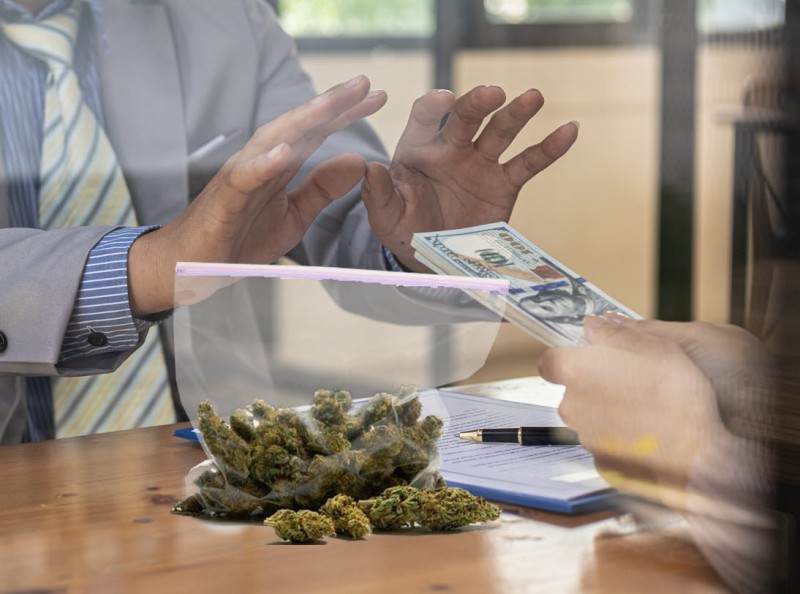
In April, Governor Janet Mills of Maine signed a bill to help local councils cover some of the costs of inviting recreational cannabis business establishments into their municipalities. All towns that opted into the cannabis program will receive at least $20,000 to cover expenses incurred from registering into the program.
The new measure helps towns and municipalities cover their legal fees, meetings, elections, drafting or amendment ordinances, and every other expense associated with Maine's recreational cannabis program. The legislative document 1195 authorizes $20,000 for every town that accepts to host cannabis businesses.
About The Bill
Representative Tiffany Roberts is the main sponsor of this legislation. The South Berwick Rep. explained that towns associated with the state's cannabis industry might not see any return on their investments for a while; hence it is the state's duty to ease the operation costs. While towns help balance the legal use of cannabis, the state, through this bill, will assist by reimbursing some of the expenses incurred. This means that these municipalities can focus more on establishing reasonable regulations for the operators in their jurisdiction while encouraging residents and other local businesses to partner with the new industry.
The funding of each town $20k will be generated from the state's recreational cannabis public health and safety municipal opt-in fund. Maine House democrats explained that this opt-in fund is financed by the revenues generated from sales and excise taxes imposed on the new industry.
As at the time the bill was signed in April, the legislature clarified that it would be implemented in 90 days—late July.
Now that the L.D 1195 is in full effect, the state will begin to reimburse stipulated expenses incurred by all towns and cities in the cannabis program.
Reason For This Bill
Before this bill was approved, less than 10% of municipalities in Maine agreed to opt Into the adult-use cannabis program. The bill was mainly passed to incentivize towns and cities to host cannabis operators in their areas.
Lawmakers and stakeholders in the program believed that expenses are one of the primary reasons why 90% of the municipalities chose not to allow cannabis-related operations in their jurisdictions. The state's declaration to pay for expenses is one of the state's strategies to promote cannabis businesses within its borders.
The truth is that it doesn't matter whether a town or city legally approves or opts into the state's cannabis program because no matter what, cannabis is still being sold, bought, and consumed in varying quantities. In fact, it's the town's loss. Erik Gundersen, the state's cannabis office director, commented that towns must consider their resident's health and safety before making a decision. A legal cannabis industry tries to ensure that all cannabis in the market is regulated and safe for consumption.
The director of Advocacy and communications for Maine's Municipal Association, Kate Dufour, dropped her own two cents. She noted that the $20,000 in reimbursement funds might not be enough; however, it is more or less a cold comfort for municipalities that need aid or except revenue sharing.
Qualifying Expenses
Maine's Office of Cannabis Policy (OCP) launched an online portal a week ago for municipalities to register for expense reimbursements.
As mentioned earlier, only municipalities that are for the state's adult-use cannabis program qualify for this fund. According to reports, all qualifying expenses for this fund must have taken place within the last 36 months. The expenses must also be directly related to the town's process of establishing its own body of Maine's adult-use cannabis programs. This pertains to all costs associated with legal fees, cannabis ordinances drafts, public meetings, and others,
Several towns and cities are actively filling out the request form for reimbursements. The OCP is yet to issue a deadline for this.
Recreational Cannabis Legislation and Sales in Maine
Maine launched its adult-use retail program 22 months ago, in October 2020. The program has generated over $100 million in sales since it was established in 2020. According to the state's office of marijuana policy, in 201 alone, the state recorded $80 million in recreational cannabis sales.
The total of adult-use cannabis transactions carried out in the first two quarters of this year far exceeds 200,000.
According to a recent survey by the state's office of cannabis policy (OCP), over 60% of cannabis consumers in the past month purchased their products from licensed dispensaries. Less than 36% obtain their smokables and cannabis-infused products through unregulated pipelines.
The same survey also established that 6.1% of the Mainers consume cannabis from state-approved retailers. In contrast, a little over 1% use illegal sources.
Additionally, the OCP found that the state has had an oversupply of medical cannabis since the recreational market began. Despite the fact that 54% of marijuana users who buy from home-based caregivers lack a medical marijuana card and that 33% of users who buy from medical dispensaries or caregivers who offer adult-use products lack a medical card as well, there is an oversupply of medicinal cannabis in Maine.
28% of the respondents surveyed claimed they rarely have an idea of the THC contents of the products used. While 10% noted that they preferred products with 50% and more THC products. 4% said they like their products to have between 35-50% THC, while the rest enjoy their recreational cannabis with less than 20% cannabis.
Mainers prefer cannabis flowers to other types of cannabis products. This preference is followed by edibles, concentrates, topicals or creams, drinkables, tinctures, and gummies.
Bottom Line
In 2021, Maine had the lowest per-capita sales figure among eight states with an adult-use cannabis program. With the new bill, cannabis sales across the state are expected to rise significantly. All populations will have easy access to affordable and safe cannabis programs as different towns and cities would be opting in to enjoy the additional funds.
In no time, legal cannabis businesses will be competing between themselves to satisfy consumers and produce low-cost, high-quality cannabis flowers and infused products.






